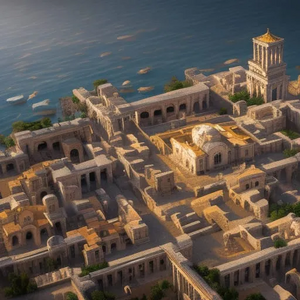Omba (city)
The city of Omba is a major city of historical and contemporary political importance, is currently the capital of the country of the same name, and was formerly the capital of the Omban Empire. Its present population is around 70,000 individuals, while at its maximum in the fourth century, it had probably 200,000 inhabitants. Situated at the mouth of the Unuzi River along Omba's north coast, it remains an important hub for trade and intellectual life.
The origins of the city of Omba lie in the distant Old Omban period centuries before the Empire existed. The historical foundation of Omba as a city is traditionally dated to 291 BE, although it is known that a town was present there well before that time. The Omban monarchy traces its line of kings back a half-century or so earlier than the foundation of the town, but by around 280 the city was definitively the seat of power of a small state centered along the Unuzi river and then extending along the coast in either direction. Over the next century, the kingdom expanded greatly, into parts of what are now Khutu, Sharai, and Hasmala. The conquests of Taizi and Daligash coincided with the Epiphany of Zunuga and the rise of the Corps, which cemented Omban power and led to the formation of the Omban Empire and the inception of the Imperial Era (IE).
The city of Omba was the political, cultural, and social heart of the Empire, and over its first two centuries, expanded rapidly and enormously, far exceeding its initial borders. Under the Nonduru dynasty, the Omban senate was solidified in more or less its present site. Even after the end of the Empire in 338 IE, the Senate had access to enormous wealth, repositories of magical items and power, and centuries of centrifugal tradition. By the fifth century, however, Omba's position began to be threatened by newly emergent powers such as Lunduso and Onighus, and its population began to decline (slowly). The Great Flood of 702 and the earthquake of 715 seriously damaged the city's infrastructure, and then finally, the sacking of Omba at the end of the Bone War in 730 ended even the pretense of its status as a central city among the Omban successor states.

